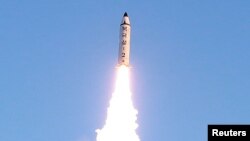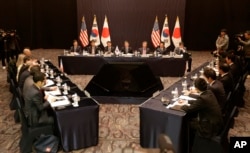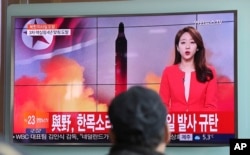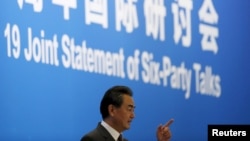President Donald Trump's administration is ramping up pressure against North Korea's nuclear ambition, while building ties with regional allies and partners to counter the rising danger of a nuclear-armed North Korea.
In a statement Monday, the State Department said North Korea's nuclear and ballistic missile programs directly threaten the security of the South Korea, Japan and the United States.
The statement came after talks in which officials from Washington, Tokyo and Seoul examined ways to restrict Pyongyang's weapons funding and "explored a joint way forward toward the complete, verifiable and irreversible denuclearization of North Korea."
State Department Special Representative for North Korea Policy Joseph Yun hosted the trilateral meeting with his Japanese and South Korean counterparts to address Pyongyang's nuclear threat, following a trilateral foreign ministerial meeting on the sidelines of the G-20 meeting in Bonn, Germany.
"The officials considered other possible measures under national authorities, including means to restrict further the revenue sources for North Korea's weapons programs, particularly illicit activities," according to the statement.
Foundation for Defense of Democracies senior fellow Anthony Ruggiero told VOA that such "strong words need to be followed by robust actions."
Ruggiero added that the three countries should implement increased sanctions aimed at North Korea's provocative activities.
"China was not mentioned, but Beijing should at least be part of the focus of renewed North Korea sanctions," he added.
At the White House, Chinese State Councilor Yang Jiechi on Monday talked to Trump briefly after Yang's meeting with Trump's national security adviser H.R. McMaster, as well as Trump's son-in-law and adviser, Jared Kushner.
White House Press Secretary Sean Spicer said the conversation was an opportunity to speak on "shared interests and national security."
Upcoming meetings
Yang is to meet Tuesday with U.S. Secretary of the State Rex Tillerson. The two spoke over the phone on February 21 during which U.S. officials said both "agreed on the need to address the threat that North Korea poses to regional stability."
Japanese Prime Minister Shinzo Abe's national security adviser, Shotaro Yachi, is also visiting Washington and is scheduled to meet with McMaster.
The meetings come after North Korea's February 12 ballistic missile test.
The United States, China, Japan and South Korea are members of the so-called "six-party" talks, a series of multilateral negotiations held intermittently since 2003 for the purpose of dismantling North Korea's nuclear program.
Under a 2005 six-party joint agreement with South Korea, the United States, China, Russia and Japan, North Korea agreed to abandon all nuclear weapons and existing programs in exchange for economic aid, security guarantees and improved diplomatic ties.
But Pyongyang failed to live up to its commitment and has since conducted several nuclear and missile tests.
Plans to bridge talks between North Korean officials and former American officials were reportedly dropped after the State Department withdrew visa approvals for Pyongyang's top envoy on U.S. relations, according to The Wall Street Journal.
A State Department spokesperson declined to confirm the report of visa withdrawals and told VOA "we do not discuss the details of individual visa cases."
Some former U.S. officials say it is time for Washington to take a different approach in its dealings with Pyongyang, such as directly engaging with the reclusive and unpredictable regime. They argue such engagement could help to determine ways to avoid a possible confrontation that is in no one's interest.
Others, including Brookings Institution's senior fellow Richard Bush, say they do not see the need for such a dialogue.
He notes North Korea "knows how it needs to change its goals to satisfy the other parties and how to contact the U.S. government to talk about such changes," but does not want to change policy.
"The problem is not the difficulties in communication," Bush added. "It's a conflict of goals between North Korea and the United States."







